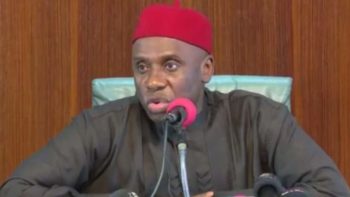
The Minister of Transportation, Rotimi Amaechi on Monday said the development of intermodal transportation would reduce the influx of people and trucks to port cities .
Amaechi made the remarks at the opening ceremony of the 15th National Council on Transportation in Sokoto.
The minister, who was represented by Sabiu Zakari, the Permanent Secretary of the ministry, said intermodal transportation would reduce congestion at the ports and create jobs.
“ The development of intermodal transportation would reduce the cost of transportation, the influx of people and trucks to port cities thereby reducing congestion at the ports.
“Create jobs by the optimal utilization of the various modes, develop modern transport infrastructure as the need arises and extend the life of the already existing ones.
“By reducing the over reliance in a single mode, like we have done on the road mode in Nigeria,” Amaechi said.
He said government has made modest strides in linking Apapa port to rail, saying bonded containers are being transported by rail from Apapa port to the Inland Container Nigeria Limited (ICNL) depot in Kaduna.
Amaechi said plans were underway to connect all the seaports, airports and all the Inland Container Depots by rail.
The minister said the economy was down and needs the transportation sector to contribute immensely to the economy.
Declaring the event open, the Sokoto State Deputy Governor, Alhaji Ahmed Aliyu called for the extension of railway lines from Kauran Namode in Zamfara State to Sokoto.
Aliyu, also the state Commissioner for Works and Transports, urged the Federal Government to establish Inland port in Illela Local Government, being centre for commerce.
The deputy governor, who was represented by the Permanent Secretary of the ministry, Alhaji Bello Abubakar, expressed government’s readiness to revive business activities in the state.
Presenting his first lecture, Dr Aminu Yusuf, the Director General, Nigeria Institutes of Transport and Technology (NITT), Zaria, called for integration of transportation sector to model system.
He said that Nigeria is signatory to World Trade Organisation (WTO), hence the need for liberation of transportation to international standard.
